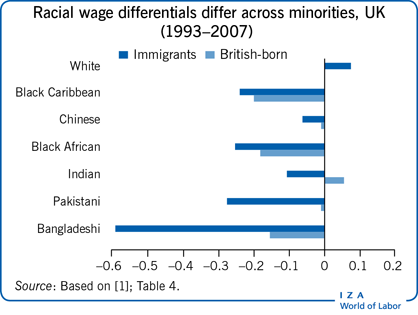Elevator pitch
In many developed countries, racial and ethnic minorities are paid, on average, less than the native white majority. While racial wage differentials are partly the result of immigration, they also persist for racial minorities of second and further generations. Eliminating racial wage differentials and promoting equal opportunities among citizens with different racial backgrounds is an important social policy goal. Inequalities resulting from differences in opportunities lead to a waste of talent for those who cannot reach their potential and to a waste of resources if some people cannot contribute fully to society.
Key findings
Pros
Racial wage differentials can be observed even in the absence of wage discrimination.
Racial wage differentials are often the result of differences in individual characteristics (such as education or experience) or of segregation into low-paid jobs.
Racial wage differentials vary substantially not only between, but also within racial groups, e.g. across generations and between men and women.
Since there are various sources of racial wage differentials, policies need to address more than one source of inequality.
Cons
For some racial groups, sample sizes are too small to permit separate empirical analyses.
Lack of empirical evidence for some racial minorities can make it more difficult to identify targeted policies.
A lack of targeted policies can leave some racial minorities behind and experiencing persistent inequality.
It may be difficult for the public to accept policies that are targeted toward some racial minorities but not to others.
